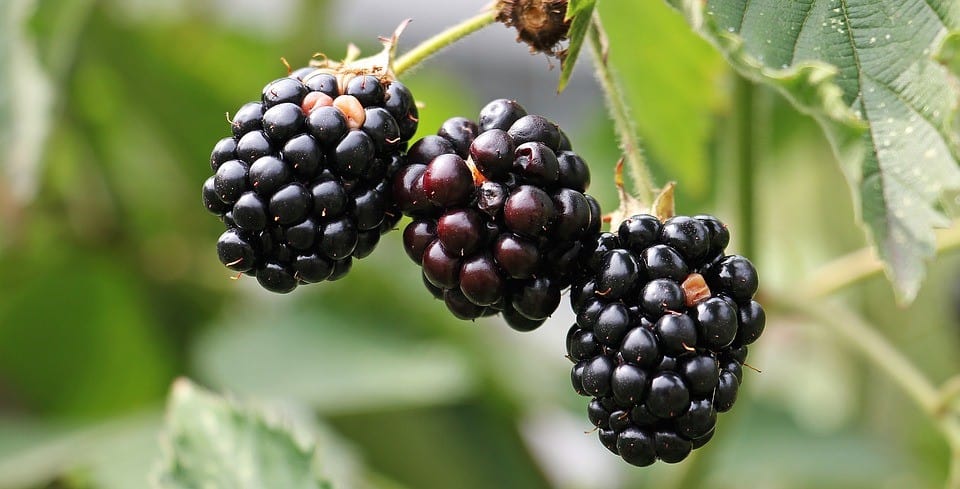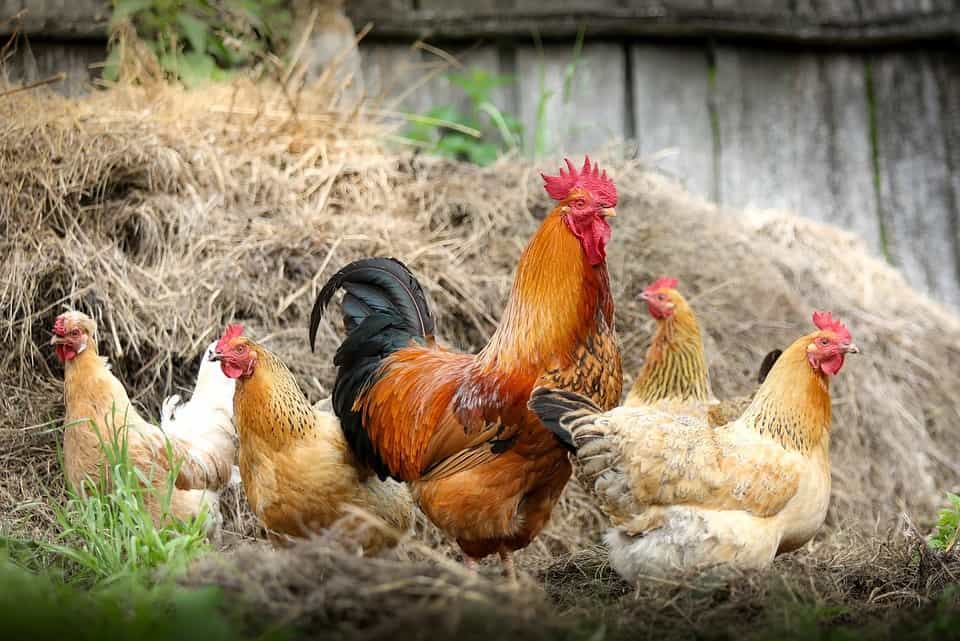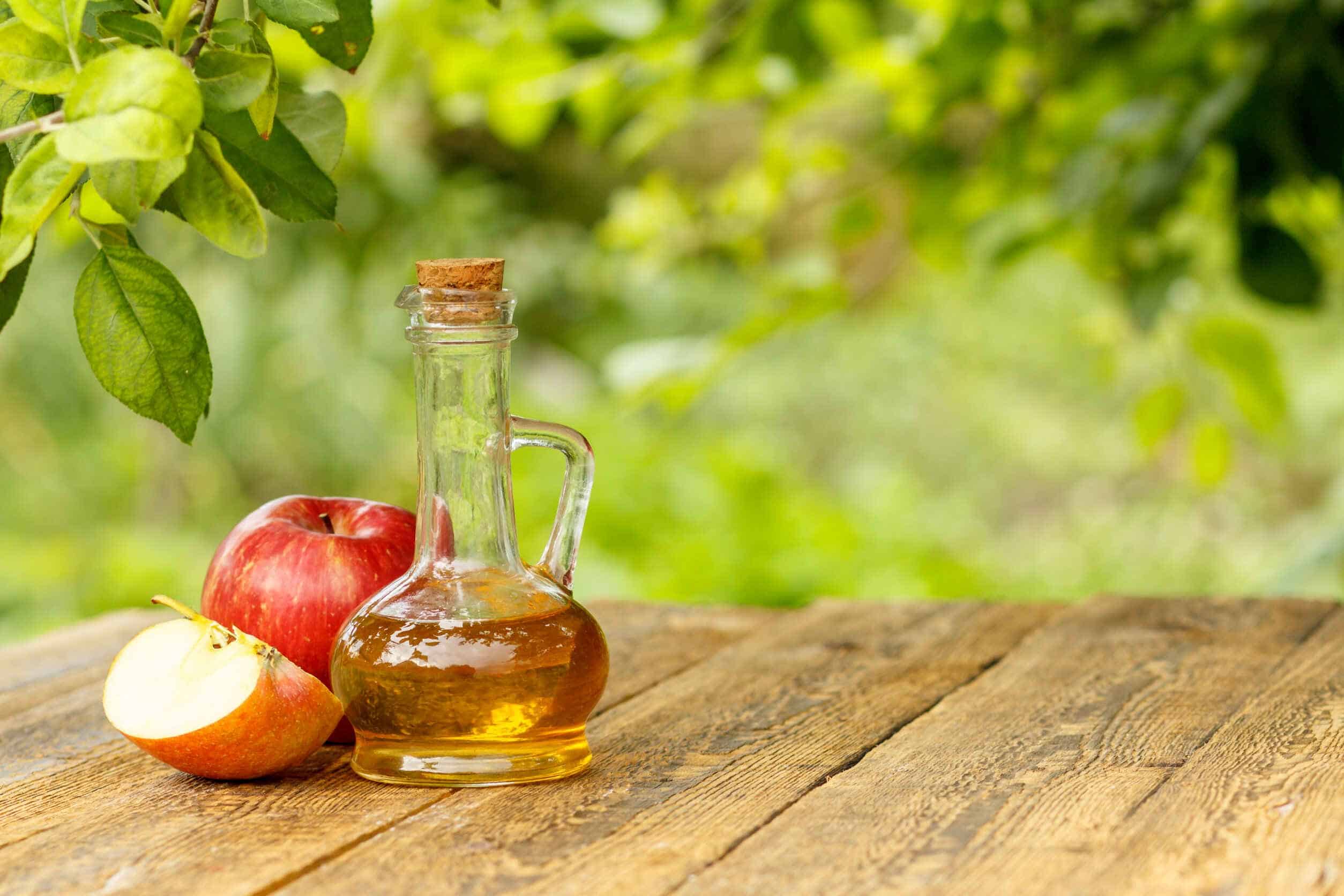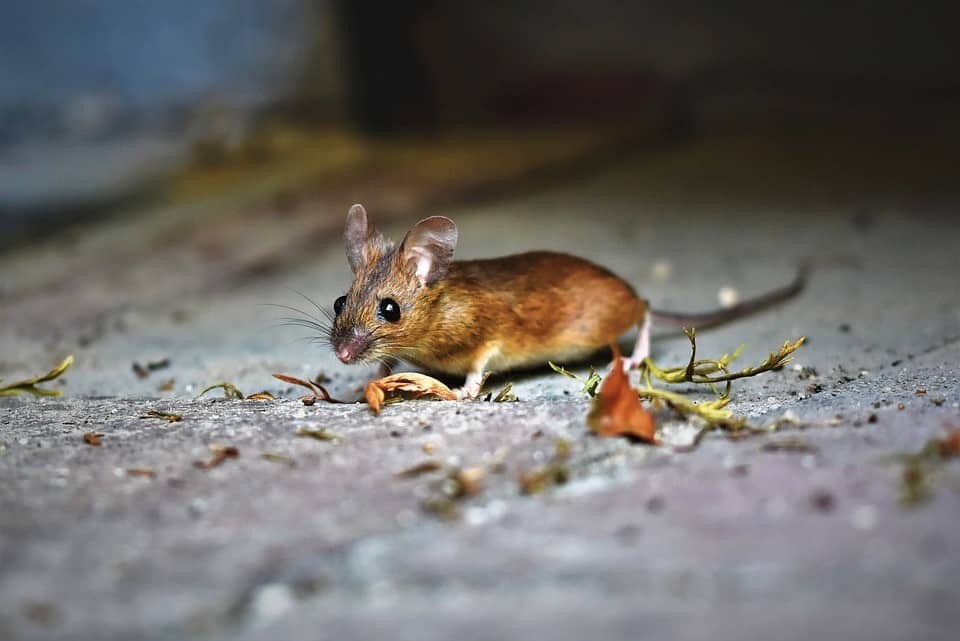Blackberries make for a nice treat for everyone on hot days, coming whole, jammed, or preserved, with all equally delicious. They can also be grown for cheap, and going off how common these are in the wild may well be a good choice for a few reasons we plan to cover. Are they any good for chicken feed though? Can chickens eat blackberries?
Absolutely – most chickens love blackberries. They provide a lot of nutrition at good prices, being high in fiber, vitamin K, and Manganese. Blackberries are best given to them as occasional treats and require some preparations to avoid the worst of risks for your flock.
Blackberries are great for chickens, but can’t meet all of their nutritional needs. Below are a few pros and cons to introducing these delectable treats to their feed.
Can Chickens Eat Blackberries?
Blackberry Nutritional Information

For people, blackberries are some of the healthiest things we can eat. The same applies to chickens, with the main draws being their high fiber, Vitamin K, and Manganese content.
Manganese is a mineral that greatly aids both the immune system and the body’s calcium absorption. It helps regulate their bone development, blood sugar, and protein digestion.
Fiber also helps in these pursuits, on top of encouraging good bowel movements. This is especially crucial to note as chickens are very vulnerable to diarrhea. In extreme cases, this may even lead to blood poisoning from infected bacteria slipping into their bloodstream. Blackberries are some of the most fiber rich fruits for their size and can help mitigate this worrisome possibility.
Lastly, Vitamin A, C, and K are excellent additions that improve not only your coop’s quality of life but the quality of the eggs they lay. Vitamin A is known to bolster hens’ egg-laying capability and improves eyesight for both genders.
Vitamin C reduces the likelihood of disease development, while Vitamin K keeps your chicken’s blood clotting properly, on top of minimizing the possibility of blood spots on the eggs laid.
All of that said, this is all insufficient for a healthy chicken’s needs. Restricting them to a diet primarily composed of blackberries will stunt their health. On top of that, blackberries are also very high in sugar, which can not only overload their sugar regulation but attract unwanted pests if given to your coop in excess.
Do Chickens Even Like Blackberries?

Most chickens love blackberries. Exceptions might crop up due to their own taste preferences, but not to the point that it wouldn’t be worth using them. Blackberries are treats and should be offered in moderation rather than turned into a staple of their diet.
Most love them to the point of gorging themselves on what’s accessible. Chickens may fight one another for treats – this isn’t just restricted to blackberries. Try to avoid situations where this happens outside of your notice. You’ll want to be there anyway, as uneaten blackberries spoil quickly, leading to a whole host of other problems to be discussed later.
Make sure to keep them away from the source of the berries as well. Wire off any exposed berry bushes if you’re growing them on your own. This is less of a concern for pre-purchases berries, but that needs careful consideration regarding the possibility of pesticides in their food.
The bottom line is not turning blackberries into a regular part of their feed, as they might refuse to eat food that provides the rest of their dietary needs.
How Often Should You Give Them Blackberries? How Much?

A few berries once or twice a week is plenty. Make sure to distribute the blackberries so that every chicken gets their share, and remove whatever doesn’t end up eaten before mice get drawn to it. If you can rotate treats from a selection, just make sure the total treats won’t ever comprise more than about a tenth of their diets.
Rotating treats would be preferred, as chickens can tire of the same meals pretty quickly. Good selections to introduce include bananas, blueberries, and tomatoes. All these fruits provide different nutritional benefits, and for the most part, should be easy to buy or even grow at home.
Storing and Preparing Blackberries for Your Flock

Store blackberries away in a closed, dry container in your refrigerator. Too much moisture leads to quicker decay or even potential mold development – something that can very much end up lethal for chickens.
Toss any blackberries that develop even a hint of mold. While it may be tempting to just cut the ruined bits off, the cost of a sick chicken would outstrip any savings you might have made off the choice.
Try to sort your blackberries before preparing them – prioritize the most tender berries for immediate usage. They’re very soft and liable to pulp under even moderate pressure. Even rinsing them multiple times could lead to that.
Preparing Blackberries
Once you select your pick of the blackberries, rinse them gently under clean and cool water. The fruits can also be submerged to similar effect, and this method could be ideal for the softer berries.
Be sure to pluck any errant stems still attached, especially if your blackberries were store purchases. Most commercial fruits have been treated with pesticides humans can tolerate, though it would still be unwise to push that thought. In smaller animals, the effects could lead to illness.
Another option would be rinsing them in diluted vinegar. Good ratios for this would be about 1:3 vinegar to water, and submerge what comes out in cool water for a few seconds to remove the acerbic taste. Funny enough, this actually also doubles as a great chicken coop cleaner – simply transfer it into a spray bottle and apply liberally.

Alternatively, you can skip the entire rinsing process by using apple cider vinegar. Apple cider vinegar a common supplement farmers give their chickens, though usually delivered in a stricter ratio: namely 1 tablespoon per gallon of water. It’s often delivered into their waterers as a result. Simply reserve a small quantity of their water mix for blackberry preparation purposes.
Give it to them in different containers from their usual feed. Blackberries decay much quicker than their usual grain or mash. Mixing the two could lead to rotten blackberries over time, ruining their meals, drawing in mice, and needing to be separated by hand.
Don’t mix it into their feed, as they decay at different rates compared to their usual fare of grain or mash. Mixing them could lead to rotten blackberries ruining their meal, necessitating urgent manual removal that takes time and effort.
Serving Blackberries
Blackberries can be given to them whole, pulped, sliced, or frozen. The frozen ones in particular are great choices in the summer, while slicing or crushing them could help you ensure your fruit’s wellness against the possibility of burrowing insects. That said, contaminated blackberries are pretty easy to spot, and don’t necessitate such extreme measures to check. Any blackberries that appear to be rotten or moldy should be thrown away.
As mentioned, make sure you give them dedicated containers for that. Blackberry seeds aren’t choking hazards for chickens, and are perfectly fine treats regardless of how you’ll choose to serve it to them.
Common Risks
Blackberries rot very quickly, with even refrigerated berries lasting between two to three days. They’re very soft fruits, and they only soften further as they decay, producing very dangerous mold that could potentially turn into botulism. While their high sugar content and acidity offset this danger somewhat, leaving them to spoil will lead to possible contamination scares.
Rodents

Rotten and moldy berries also attract mice. When feeding chickens blackberries, be sure to clear out their bowls by nighttime at a minimum. Rodents are undesirable company for chickens for quite a few reasons.
Firstly, rodents are notable carriers of ticks, mites, disease, and lice – all of which can easily spread to chickens and their caretakers. An especially dangerous example is salmonella poisoning. It transmits through mice droppings, and the rodents themselves will not be adversely affected or even demonstrate any symptoms of salmonella poisoning.
On a more active note mice will harass the residents of your chicken coop. They’ll feed on eggs, kill baby chicks, and disturb your coop’s residents in their sleep. The most common ways they do just that is either nibbling on their feet or plucking off feathers for their own nests.
Mice usually find their way into such places, but leftover blackberries incentivize this troublesome behavior. Make sure to remove any trace of treats from your chicken coop come night.
Common Pesticide Contamination Spots
The berry itself also has a green, leafy spot above called the calyx. This portion is especially affected by pesticides introduced during the growing process, and can drastically affect feeding poultry. Pesticide contamination in feed passes it onto both their eggs and meat, in turn making the people eating them sick.
While pesticides may be an issue for both blackberry leaves and calyx, the former usually remains uneaten. The latter due to its closer proximity to the treat itself makes them more likely to be consumed. The pesticide can be removed by thorough washing, but it would be much safer to just pluck it away altogether.
On a more mundane note, blackberries are certain to dye your chicken’s poop a shade of purple. Don’t panic at that particular shade. Though if you see any yellow or green droppings, it would be prudent to tighten up your coop’s security, as that’s a telltale sign of salmonella infection.
Chickens will also overindulge given the opportunity. If their blackberries come from wilder sources, try to fence off their enclosure to prevent them from gorging on the sugary treats. Chickens with healthy feed are unlikely to have weight or nutritional concerns. Finally, try to feed them blackberries in the morning, as it’s better for their digestion than evening feedings.
Final Thoughts
Chickens like blackberries, and in reasonable quantities, it’s great for them. Handle their preparations properly, and clean up their leftovers before it starts drawing in some unwanted company. They make for an excellent snack and dietary supplement, but don’t get them used to it.

